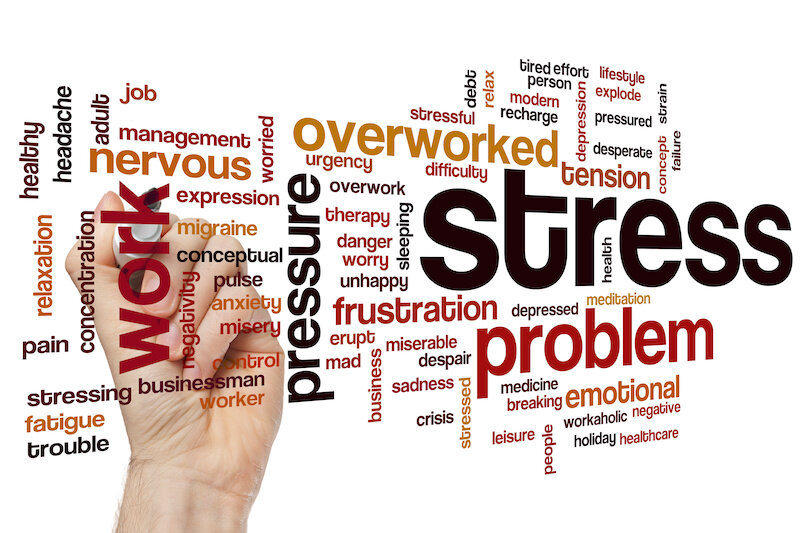6 Simple Ways To Reduce Stress For Fat Loss
What is one chronic practice (hint: habit) in your life you can be assured leads to weight gain, poor sleep, pesky and serious illness, poor decisions, depression – and unhappiness?
Chronic stress.
Stress is your body's reaction when it feels threatened in some way. When your body is stressed, its own "first responder," the hormone cortisol, goes to work to relieve your heart and soul of the strain on your body. Cortisol, also known as your "stress hormone," is made by your adrenal glands -- two small glands that sit on top of your kidneys. Along with helping you respond to stress, it also plays a key role in other functions, including how your body breaks down carbohydrates, lipids, and proteins.
How does stress impact your weight loss?
It leads to poor sleep
Triggers Headaches
Can lead to digestive problems
It makes you hungrier for carbohydrates and can lead more easily to obesity
It slows your metabolism
It can lead to taking prescription medication for stress and anxiety
Leads to decreased cognitive function
Creates an environment for reduced productivity
Can more easily lead to injury and/or the ability to recover from it
Serious medical conditions like diabetes, heart disease, or even death
Below you will find six simple strategies I've seen and practiced (and that work!) that lead to stress resilience, fat loss, and ultimately increased confidence.
1. Make deliberate breathing a daily habit
Deliberate breathing takes minimal effort, calms your mind and body in the moment of stress, and prepares you for the unexpected stress later. While we take it for granted, focusing just on your breathing can help you get in tune with your body and "take the edge off" a stressed-out brain. It's also a very effective method to easily incorporate at any time during your day, lowering your stress through little effort.
2. Stop Multitasking
Doing more than one thing at a time is hard on the brain. Your brain is not a super-computer and is certainly not "wired" to accomplish multiple activities at once, or at least not well. When we multitask, we don't do anything well because the task at hand is getting less than our full attention.
Talking on the phone and checking email? Spend time the next day fixing the mess you created because you weren't paying full attention to the call.
Eating while working? Say hello to digestive issues, which also lead to weight gain.
Complete each task, then move onto the next to best care for your brain and your stress.
3. Make sleep a top priority
Adequate and quality sleep is foundational, like breathing, to your stress reduction. Getting 7 - 9 hours of quality sleep per night is essential. The body was made to get up with the rising of the sun and fall asleep with the setting of it. Yet, due to modern life, we are now asking so much more from our bodies, pushing them well beyond how we were wired.
Sleeping fewer than 7 hours can make you 3 TIMES more likely to get sick. Lack of sleep suppresses the immune system and makes you more reactive.
Sleep leads to greater intelligence and is also an indicator of your ability to respond instead of reacting to daily stress. Without adequate and quality sleep, your brain is less productive and less able to manage emotions – and emotional eating.
4. Exercise daily
You already know regular exercise tends to lead to a longer, healthier life. Yet, did you know WHY it is a HUGE STRESS reliever? Physical activity improves your body's ability to use oxygen and improves blood flow, and increases your "happy" hormone serotonin.
This has a wonderful impact on your most important organ: your brain. It helps your brain produce "endorphins," the feel-good neurotransmitters responsible for that famous "runner's high." Admit it: exercise, for the short term at least, takes your mind off your worries.
5. Significantly reduce your screen time
Blue light, the type of light emanating from a computer, TV, or cell phone, is terrible for your wellness. It is a way your body senses it's time to be awake and alert. It is supposed to be greater during the day when we all work, learn, and eat. Yet, at night, our body wants darkness to sleep. We were all hunters and gatherers at one point. Daylight was for work; the night was for sleep (or, for some, to hunt).
Being "always-on," with little breaks from devices, places your brain on "overdrive" and doesn't allow it to recover from our normally stressful lives.
6. Embrace silence
Anyone who has worked with me a day knows my mantra: drive in silence. It is the one time of the day you can be assured of silence. And, after all, we ARE driving a machine and need to be paying careful attention to it.
There is so much background noise in our lives: sirens, people talking, phones, or even simply the voices in our heads. Our brain wasn't wired for constant attention and commotion. Whether it is 10 minutes per day or 2, a silence break will give your mind – and your body – a dose of relaxation where it doesn't need to do anything yet keep you alive. 😉
Share this article or sign up for our newsletter and check out my new corporate and concierge programs at https://alexandriawellness.com/corporate-wellness/



